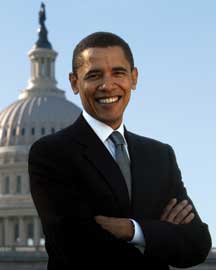| Is Bobby Jindal, the governor of Louisiana, the Indian American Barack Obama, a man who transcended racial boundaries?
Bobby Jindal was born Piyush Jindal and received his nickname Bobby in grade school to make it easier, no doubt, on his peers and teachers. He retained Bobby in adulthood and during the campaign, he fashioned a public image that shied away from his roots and focused instead on his message.
His official first name Piyush did not appear on his posters, badges, or banners. Hillary Clinton used a similar strategy when she campaigned simply as Hillary during her Senate bid to distance herself from her husband Clinton. To further complicate the issue, Jindal converted from Hinduism to Christianity in high school and later became a Roman Catholic, a spiritual conversion, which, by all accounts, was genuine. I am not seeking to argue that Bobby Jindal is running from his heritage, but he is hardly a mainstream Indian American. In my own personal experience, I can recall only one person who Anglicized his name and converted from Hinduism to Christianity. Now Barack Obama too has taken steps, some calculated, some not, to make himself more appealing to mainstream Americans. But Barack calls himself Barack. He has, to quote the famous line from his keynote address at the 2004 Democratic National Convention, “the hope of a skinny kid with a funny name who believes that America has a place for him, too.” People often underestimate the impact of a name on one’s image. Consider Kalpen Modi, better known as Kal Penn. The Hollywood actor, who played a leading role in Harold and Kumar Go to White Castle, changed his name after not having much success getting auditions as Kalpen Modi.
While Piyush Jindal’s decision to Anglicize his name was largely out of his control – done in grade school by adults – Kalpen Modi made a calculated decision to change his name to improve his career prospects. Penn says he changed his name as a bet with some friends to see if his acting luck would improve. It seemingly did. However, what started out simply as a bet ended up as a lifestyle choice and permanent career move. Kal Penn clearly does not share Barack Obama’s hope. Even after achieving considerable fame, he did not reclaim his Kalpen Modi name in subsequent movie credits, which is particularly ironic in the case of The Namesake.The movie (based on the book by the Pulitzer Prize-winning author Jhumpa Lahiri) tackles the notions of identity and uses the name as a lens to examine the immigrant experience. In the movie the main character is named Gogol Ganguli by his father after his favorite Russian author. Gogol is intended to be his pet name, one reserved for his family and private life, but it ends up on his birth certificate, because his formal name, Nikhil, sent from Calcutta by his grandmother, does not arrive in time. Despite his parents’ futile wish that he be called by his formal name Nikhil in school, once he goes to school, Gogol becomes his official name. However, as Gogol ages, his attitude toward his name changes and he seeks to legally reclaim the name Nikhil. He asks his father, “How will Gogol look on a resume?” So, Gogol, a non-Indian name, is legally changed to Nikhil, a very Indian one. It seems an ironic choice to cast Kal Penn as the lead in such a movie, as he has done the very opposite – changed his Indian name to Anglican. To be fair, though Penn’s name change was calculated, the selective pressure to do so comes from the world we live in. In this worldview, tolerance is only an ideal that is valued within the scope of what is American – that is capitalism, that is democracy, that is the Western point of view, that is John and not Ahmed.
Kal Penn’s upcoming movie, the sequel to White Castle, illustrates this point well – almost as a symbolic acknowledgement of the irony apparent in The Namesake. Tentatively set for release in April, the title itself speaks volumes: Harold and Kumar Escape from Guantanamo Bay. I ask you: How does Kumar end up at Guantanamo Bay? Because his name is Kumar. A foreign name like Kumar makes the idea of Guantanamo Bay, an infamous prison holding suspected terrorists, credible. I bet if the movie had been about two men named George and Bill, it would have to be titled differently – maybe George and Bill Escape from a Minimum Security Prison. As Jindal’s and Penn’s careers progress, undoubtedly, with considerable success, the questions of Indian American acceptance in U.S. society will continue to linger. After every new electoral victory by Jindal or acting feat by Penn, people will wonder if Bobby or Kal is our Barack? I would be skeptical. Bobby’s and Kal’s careers do demonstrate that Indian Americans can succeed in the United States in arenas requiring public approval. However, until an Aneesh Kulharya or Nakul Chigurupati wins a seat in Congress or leads a Hollywood feature film, I would be cautious about concluding that Indian Americans have “arrived” or gained universal acceptance in the American consciousness. |
What's In A Name?

